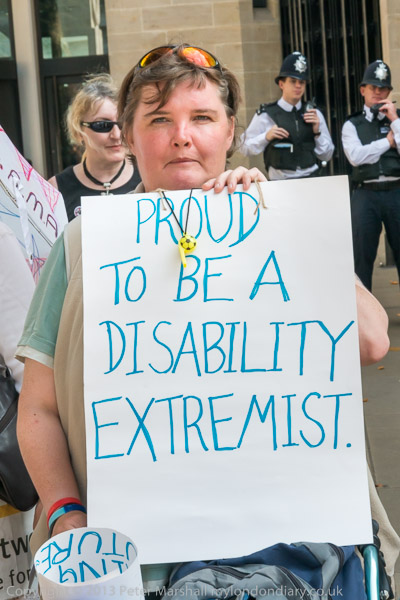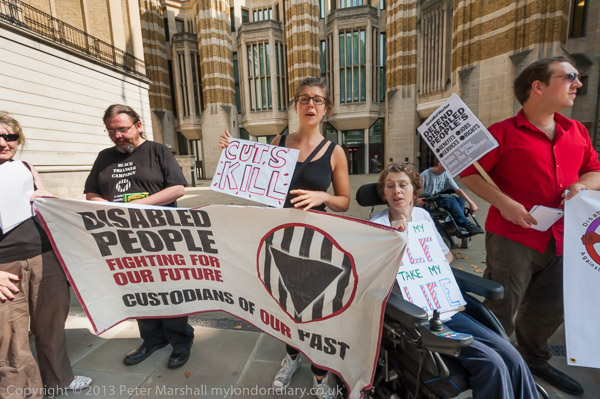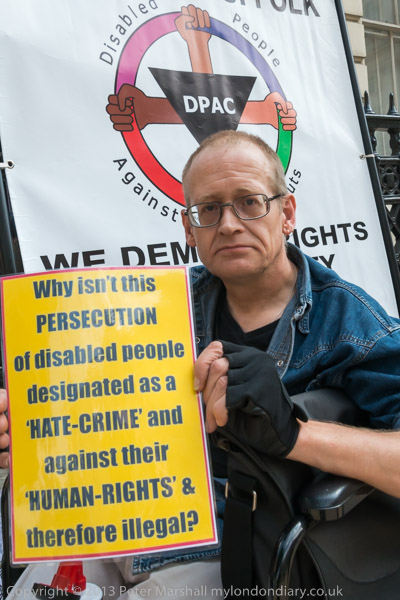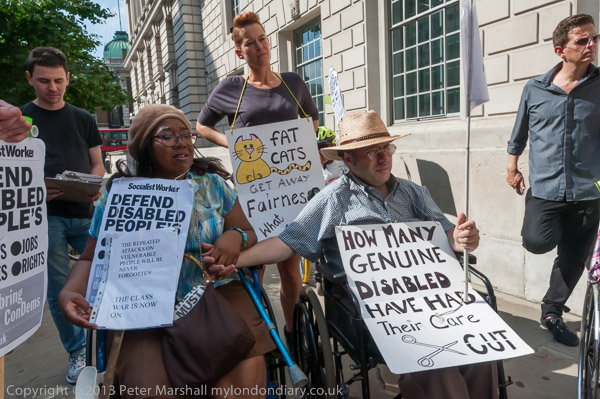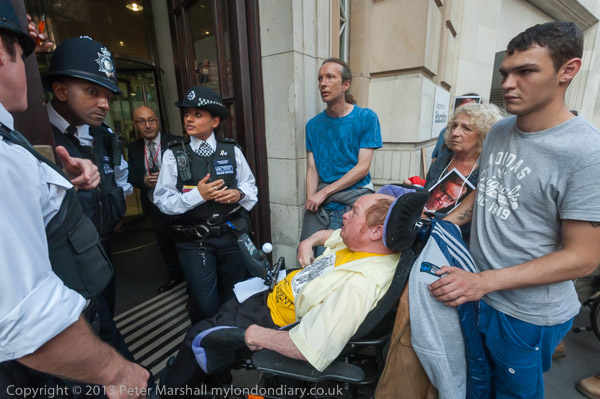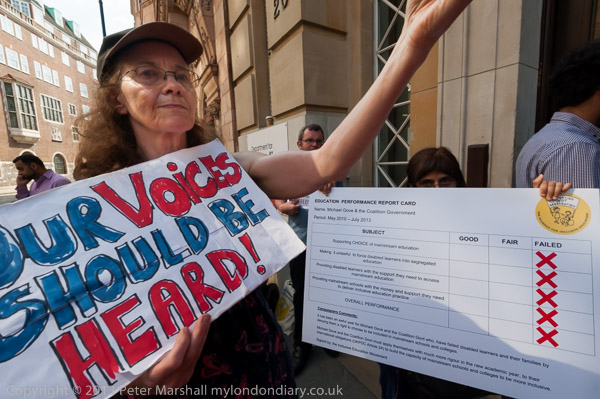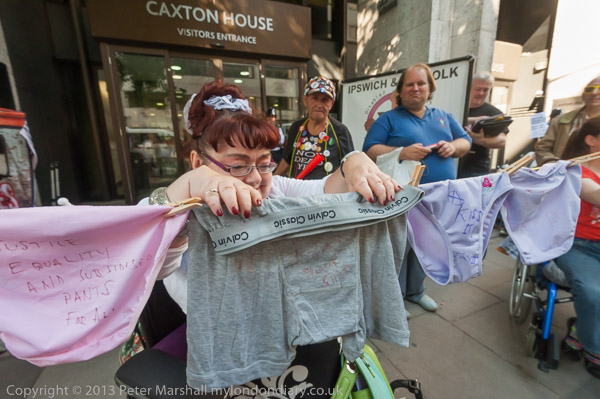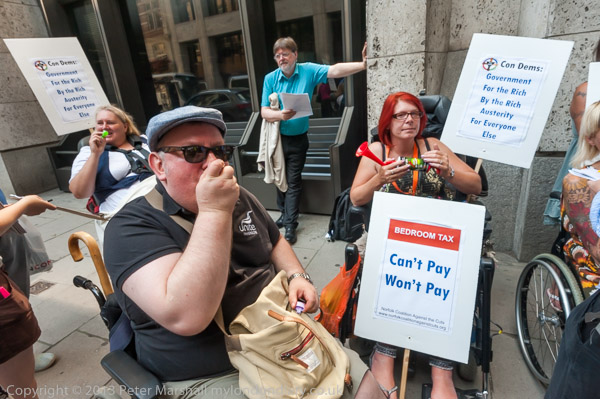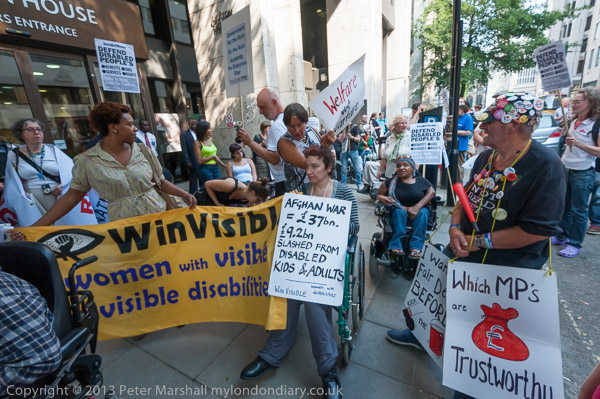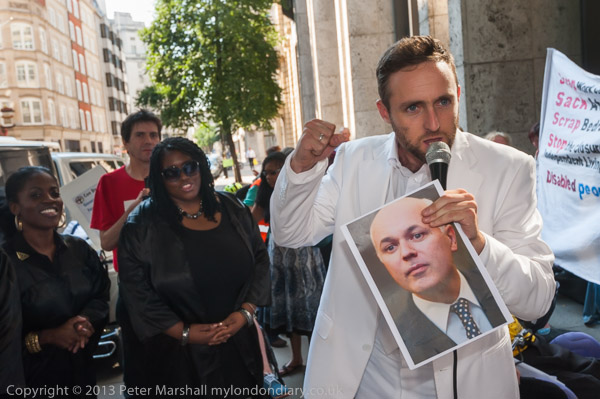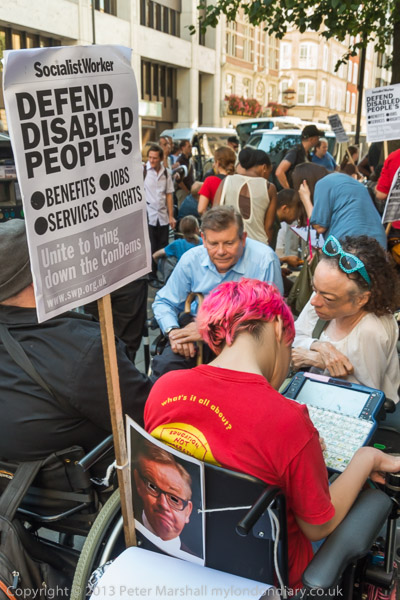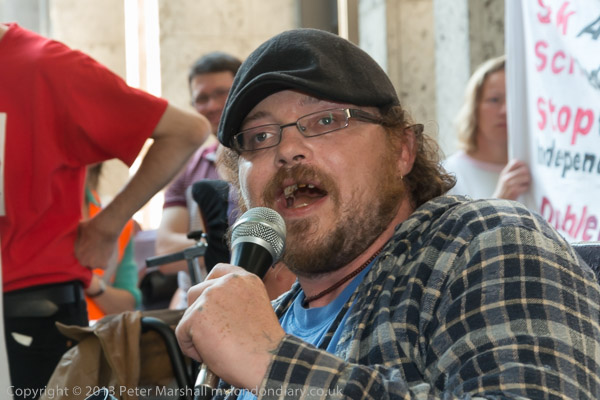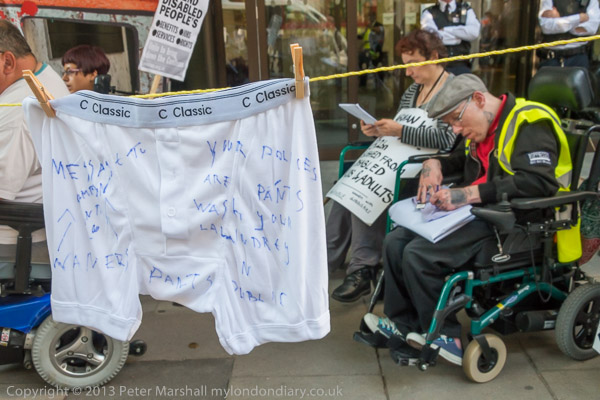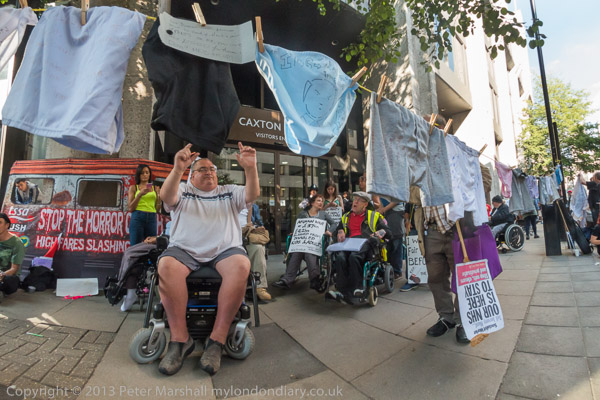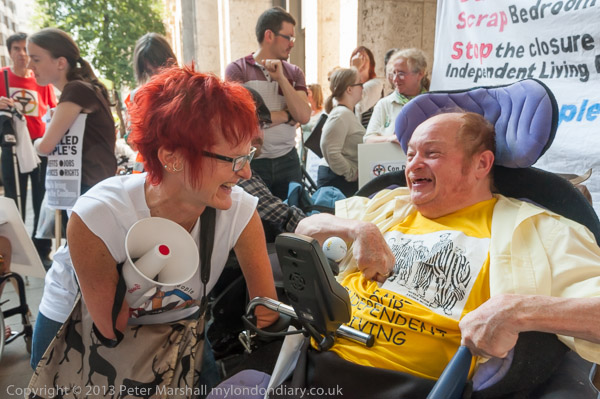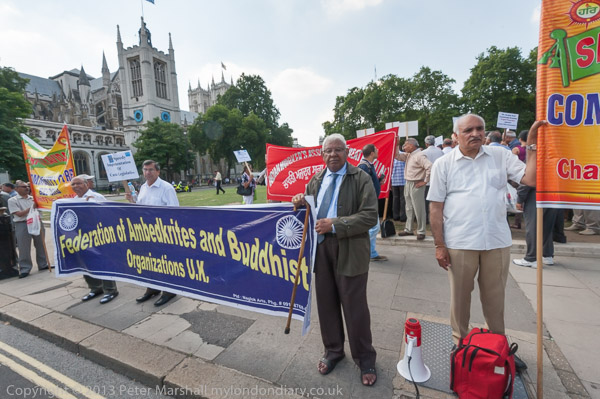Welfare State & Tar Sands Party: On Saturday 10th of April 2010 pensioners led a march to defend the welfare state and oppose cuts in public services and later I went to a party at a BP garage in Shepherds Bush against the company’s plans to exploit Canadian tar sands.
Defend the Welfare State – Temple
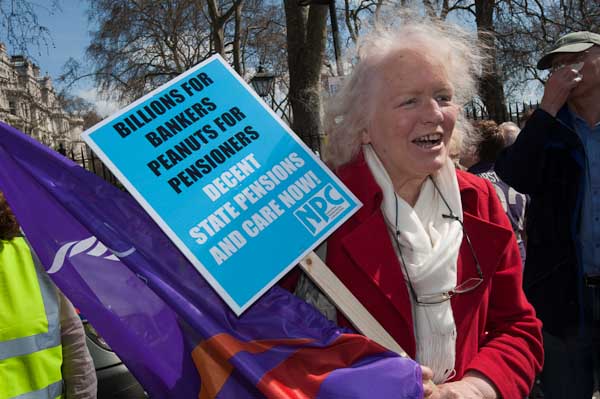
The National Pensioners’ Convention, which represents over a thousand local regional and national pensioner groups with a total of 1.5 million members had organised a march and rally in London to defend the public services they are particularly dependent on ahead of the 2010 general election. The march was supported by the TUC and all major unions.
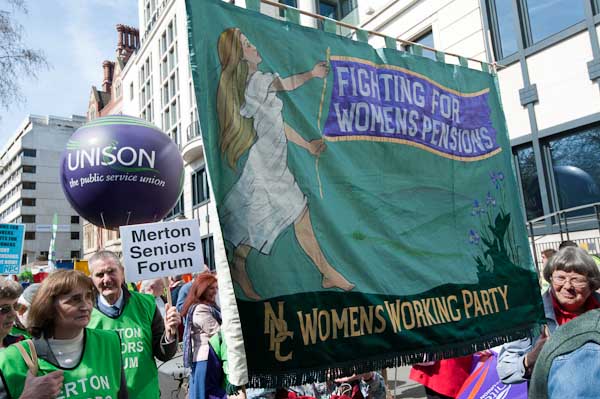
Age Concern has predicted that over 40% of votes in the next month’s election would be made by those over 60, and had identified five key issues which particularly impact pensioners. In particular they said that the basic state pension was seriously inadequate and the pension rise of only £2.40 was far too low. A quarter of all pensioners were living in poverty.

But all three major parties were making plans for cuts in public expenditure and moving away from the consensus Britain had come to during and after the Second World War, the welfare state with pensions, a free NHS, free education and other public services. Over the years some of these provisions had been eroded (and in a few areas such as dental care, never fully implemented) but now they were increasingly under threat, whichever party wins the general election.

Huge deficits had come from handouts to the bankers and the cost of wars in Iraq and Afghanistan, and the NHS had been hit particularly hard by the costs of privatisation under the huge debts from the Private Finance Initiative.

Cuts to local authorities who many pensioners rely on for social care and support services such as meals on wheels, as well as housing benefit, threaten the daily life of many and are leading to the closure of day centres and other provision.

It was pressure from protests such as this, as well as the presence of the Lib-Dems in the coalition with the Tories that was elected that led to the introduction of the “triple lock” on pensions in 2010. In 2020 the state pension was around 16% of average earnings and by 2025 it had risen to around 25%. But pensioners have been badly hit by cuts in care.
More at Defend the Welfare State.
Tar Sands Party at the Pumps – BP, Shepherd’s Bush Green
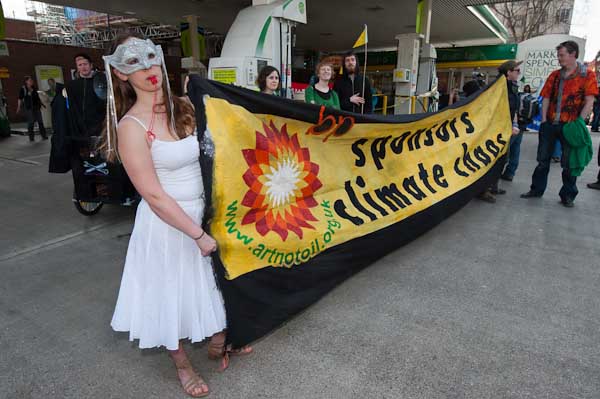
The UK Tar Sands Network, Rising Tide and the Camp for Climate Action had organised a ‘Party at the Pumps’ as a part of a ‘BP Fortnight of Shame’ trying to get BP shareholders to reverse the company’s decision to take part in the exploitation of the Canadian Tar Sands which environmental activists say is “the dirtiest and most desperate attempt yet to profit from – and prolong – humanity’s crippling addiction to oil.“
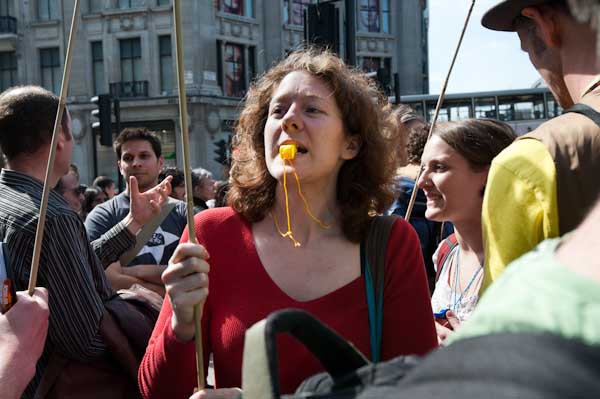
Extracting usable crude oil from tar sands always results in between three to five times the amount of carbon dioxide production as normal oil wells. Deposits close to the surface are strip mined, destroying ancient forests and peat bogs to dig up around 75 metres depth of sand and oil with huge trucks and mechanical shovels.
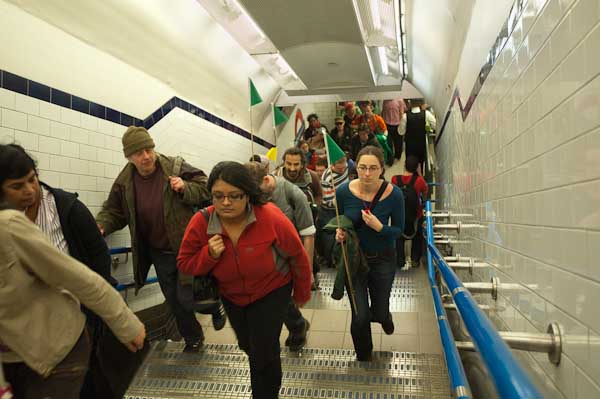
In Alberta four-fifths of tar sands are too deep to be mined in this way and are brought to the surface by the injection of high pressure steam – which uses around twice as much energy and pollutes twice as much highly toxic waste water which is already leaking into drinking water.
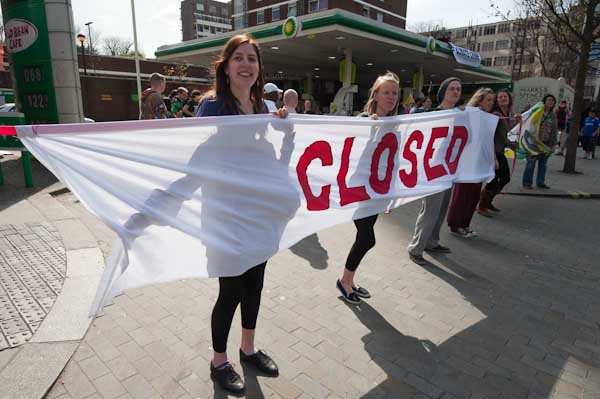
Indigenous people living in the area have very high cancer rates and their staple moose meat has been found with 300 times the acceptable level of heavy metals from the tar sand extraction.
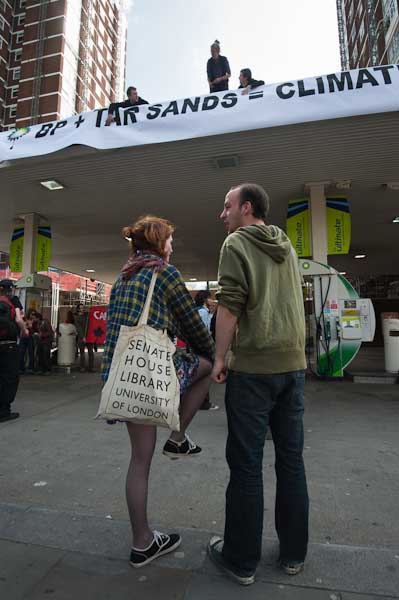
BP only got involved in the Canadian tar sands in 2007, probably because they had cheaper sources of oil elsewhere. They signed up with Canadian company Husky Energy for a large-scale tar sands project they called the ‘Sunrise Project’ and for other tar sands projects. This was put on hold when oil prices crashed in 2008, but BP shareholders were expected to approve it going ahead at their meeting in April 15th.
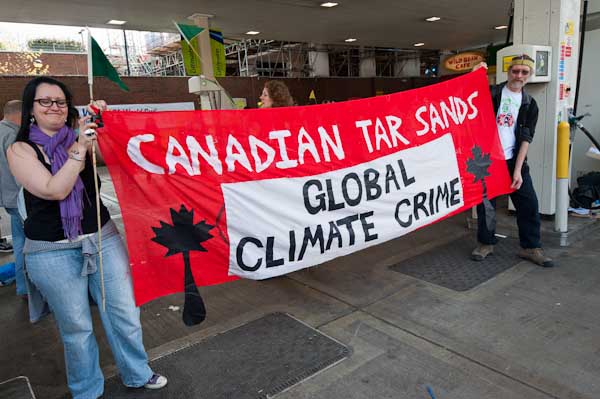
Protesters were told to meet at Oxford Circus with a Travel Card and after an hour or so we all – including a few police – went down into the station following those with green and yellow (BP’s colours) flags, at least some of whom knew our destination and boarded a west-bound Central Line train.
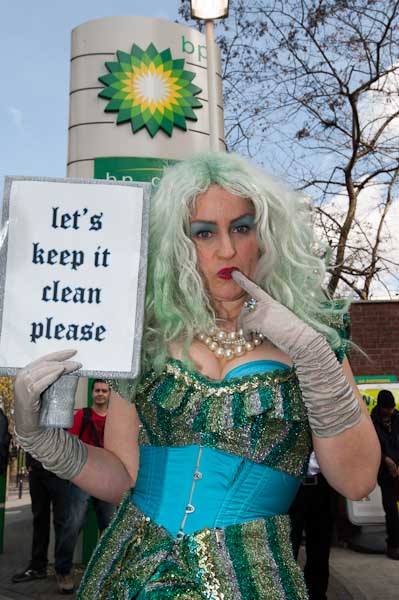
At Shepherds Bush the message came to alight. We rushed behind those carrying the flags along the busy shopping street, across the green to the BP garage on the south side, which had already been occupied by a smaller advance group of demonstrators.

Some of them had got onto the roof from scaffolding on a neighbouring block of flats and were fixing a banner there, while others blocked the forecourt entrance with a large ‘CLOSED’ banner. The protesters occupied the area and put tapes and stickers around the petrol pumps and elsewhere with the messages ‘DANGER GLOBAL WARNING‘ and ‘BP TAR SANDS – BACK TO BLACK?’

The Rhythms of Resistance band had also arrived and was drumming loudly and there was also a bicycle trailer sound system and the protesters were dancing. A live band and a caller played for more dancing and the protesters sat on the pavement and talk, eat sandwiches and snacks and drink, while some handed out leaflets to the passers-by and explained why the protest was taking place.

When I left after a couple of hours the protest was continuing. Police and a man from BP had earlier asked them when they would be leaving and were told ‘sometime later in the day‘ and assured that they would cause no permanent damage and although the police were still watching the protest, filming and taking notes but not otherwise taking any action. I presume BP had asked them to avoid more publicity for the event by trying to force it to an end or make arrests.
More at Tar Sands Party at the Pumps.
Flickr – Facebook – My London Diary – Hull Photos – Lea Valley – Paris
London’s Industrial Heritage – London Photos
All photographs on this page are copyright © Peter Marshall.
Contact me to buy prints or licence to reproduce.
